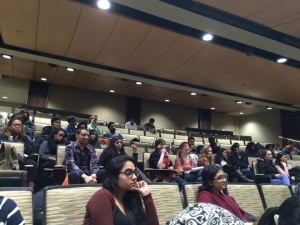The following article contained a number of errors in the print edition that have been corrected for the online version. The article originally omitted Delta Phi Omega and Rutul Amin, and contained a number of misspellings (Updated: Feb. 16, 2015)
At 7 p.m. on Thursday, Jan. 22, a crowd of students made their way to Dewey 1-101 eager to spend their evening discussing the widespread but rarely talked about issue of shadeism. While campus has recently been abuzz with conversations regarding racial discrimination and civil rights in the wake of Martin Luther King’s Day, Delta Phi Omega felt it was important to get the discussion going on another form of discrimination that affects the lives of millions of people of color, both at UR and around the world.
Similar to racism, shadeism (also known as colorism) is a form of discrimination based on skin color. Shadeism, however, is typically an intraracial issue rather than an interracial one, meaning it is based on the degree of skin tone rather than categories such as “black” and “white.” It is the new name given to the age-old idealization of fairness and condemnation of darkness within a single race community.
Shadeism has been prevalent in many different cultures for centuries as a product of slavery, colonialism and even ancient Indian mythology.
“It is unique to certain cultures in that…you see the vestiges of slavery, you see the vestiges of colonialism,” Office of Minority Student Affairs Counselor Thomas Crews explained. “When you’re darker in a colonial system or in a slave system, you have less value.” Today, shadeism continues to have visible byproducts that have disastrous psychological tolls on communities.
According to junior Divya Persaud, the purpose of Thursday’s event was to “spark conversation about what Shadeism or Colorism is and how it affects different communities from the South Asian community, Caribbean to the black community, and have an honest discussion about our experiences and what we thought caused these issues.”
Co-sponsored by groups such as Students for a Democratic Society, UR Debate Union, Association for the Development of Interest in the Indian Subcontinent and UR Debate Union, the event, titled “Shadeism: New Name, Old Problem,” began with a screening of the 2010 documentary “Shadeism,” which explores the many different aspects of this expansive issue.
The event was hosted by Delta Phi Omega Sorority and sister Rutul Amin, while much of the planning was done by senior and sister Siri Ganti.
The film, which was created by students at Ryerson University, touches on everything from shadeism’s origins and prevalence in popular culture to the powerful psychological toll it takes on young girls to the skin-lightening practices it has prompted.
Following the screening was a panel discussion on the themes raised in the video. Panelists included Persaud, along with fellow juniors Reefat Aziz and Siri Ganti and senior Alexandra Poindexter.
Despite their different backgrounds–Persaud is Indo-Guyanese with roots in the Caribbean and South America, Aziz is an international student from Bangladesh, Ganti grew up in a predominantly Indian community in New Jersey and Poindexter is a member of the African American community–each one has dealt with shadeism and its damaging effects.
“It’s really embedded in your daily life,” Ganti said, explaining how shadeism has become a normalized part of mainstream culture in India and other South Asian communities. “You’ll turn on the TV and see Bollywood actresses who are much lighter than most people in India. You go to the Indian store to buy groceries and right there is an aisle of a bunch of lightening creams labeled ‘Fair and Lovely.’ You interact with friends, you interact with family, and they all say ‘stay away from the sun.’”
Persaud discussed the similar effects of shadeism that generations of her family have encountered in South America, explaining how the skin tone of the women in her family determined how they were treated from birth.
“If they had dark skin they were not given attention by family members and wouldn’t receive gifts or money or anything,” she recounted. “Their education was neglected because they weren’t thought of as one, beautiful, or two, likely to get married to someone who is rich and from a good family.” Many of these women went on to develop severe psychological afflictions and self-esteem issues as adults.
Aziz has mostly dealt with shadeism via his mother and sister, but noted that it is not an issue that is exclusive to women.
He recounted a recent conversation with his grandmother. “[She told me] ‘We need to find you a nice, fair bride so that your children are fair,’” he remembers. “For them it’s like, ‘Okay I know you’re dark, but at least we can pair you with somebody who could [increase] the probability of your children being fair.’”
Nevertheless, Aziz emphasize the fact that shadeism is something that impacts women far more than men and is a problem that needs more attention. “I feel like stereotypes and ideas can only be broken down when people openly communicate with one another and these ideas and the truth come to the surface and people don’t keep them within themselves,” he said.
Ganti agreed, noting that “It’s something that’s so internal and very subtle, people don’t think about it, don’t think it’s an issue until someone says to their face ‘Hey, there’s a name for it.’” She hopes to be part of planning similar events in the future to continue to spread awareness about shadeism.
“Having any sort of conversation about an issue that affects us across cultural lines and builds some sort of solidarity I think is really vital to our mental health,” Persaud commented. For her, events such as this are an important starting point for combatting discrimination of all kinds.
“I feel as though a lot of the time we take in a lot of things without critically thinking about [them],” Aziz said. “Such discussions can help people critically think. When all of us go to different places… the momentum that we receive from an event like this can help us carry [on] this conversation… and at least to some extent break down these assumptions and judgments people make based on other peoples’ skin color.”
Rudd is a member of
the class of 2017.





